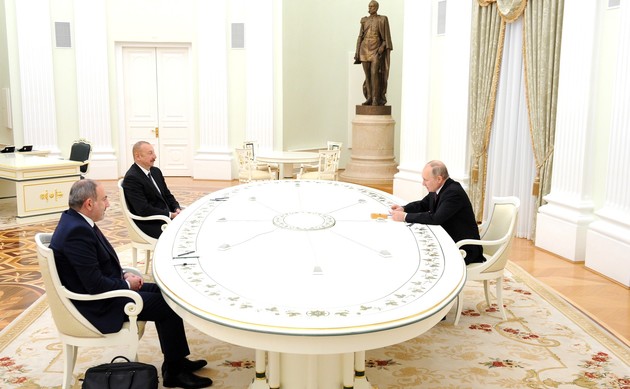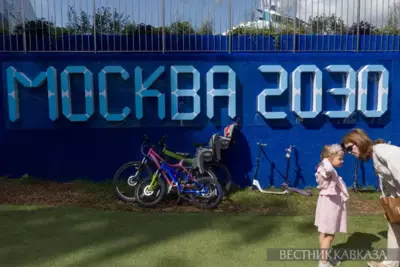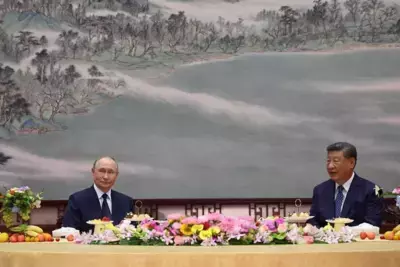Earlier this week, in Moscow, Russian President Vladimir Putin, Azerbaijani President Ilham Aliyev and Armenian Prime Minister Nikol Pashinyan signed a statement on "unblocking all economic and transport links in the region." For this purpose, a trilateral working group will be created, headed by the vice-premiers of Russia, Azerbaijan and Armenia.
Moreover, there would be expert groups responsible for drawing up a list regarding the restoration and construction of infrastructure facilities for international travel and transport crossing of the territories of Azerbaijan and Armenia, Ali Tuygan, former Turkish Deputy Minister of Foreign Affairs writes in the article The Path to Peace in Nagorno-Karabakh in his blog Diplomatic Opinion.
Following the talks, the three leaders held a joint press conference. President Putin said the ceasefire agreement of November 9, 2020 has been observed; there have been no serious violations; Russia’s peacekeeping forces are meeting their obligations in full to both parties; more than 48,000 displaced persons and refugees have already returned to Nagorno-Karabakh; and the work to rebuild infrastructure, power facilities, housing and social infrastructure is in full swing.
President Aliyev put the emphasis on the unblocking of transport connections in the region. He said, “This is critical because it allows Azerbaijan to have transport links to the Nakhichevan Autonomous Republic through Armenia after more than three decades. And Armenia will have railway access to Russia and Iran via Azerbaijan. We will also have access to the Turkish market through the Nakhichevan Autonomous Republic. In addition, Russian and Turkish railway lines can be linked. This Statement opens up tremendous opportunities.”
Prime Minister Pashinyan said that the issue of prisoners of war, the most sensitive and serious issue because it is a humanitarian problem, is still not settled. He also said that what was agreed upon in the trilateral Statement could change the economic profile of the region and such change can yield even more reliable security guarantees. But these economic issues were being complicated by the lack of progress on humanitarian matters.
Both Aliyev and Pashinyan spoke highly of their relationship with Russia and thanked President Putin for his diplomatic initiative.
Needless to say, Russia is a global power. This second trilateral meeting on Nagorno-Karabakh has confirmed yet again that it enjoys an unrivalled position in the Caucasus. The Kremlin website shows the three leaders around an oval conference table. On one side is President Putin. Across from him are his two quarreling guests now engaged by Moscow in a trilateral peace process. It is a revealing picture.
In Moscow only Mr. Pashinyan made an oblique reference the Minsk Group. A day before the Moscow meeting, “as part of coordinating the actions of the OSCE Minsk Group co-chairs”, Vladimir Putin had a telephone conversation with President Macron. According to the Kremlin, Mr. Macron expressed his support for Russia’s efforts to facilitate a settlement in Nagorno-Karabakh. He also emphasized the importance of a prompt provision of humanitarian aid to people who have suffered from combat operations, including through relevant international organizations. Apparently, Mr. Macron is looking for the right moment to pay a visit to Yerevan.
The US, the other co-chair of the Minsk Group, is trying to grapple with a major domestic crisis and the world is watching. Yet Secretary Pompeo, the sanctions czar, is now busy with the Houthis, his own agenda for 2024 and, even at this stage, undermining the incoming administration.
In the last two months Russian diplomacy has successfully secured a cease-fire in Nagorno-Karabakh. It has charted a path for the future with emphasis on regional give-and-take and economic cooperation which would transform the region. And so far, everything appears to be on track. Hopefully, Armenia and Azerbaijan would seize the moment for lasting peace. And hopefully, Russia would remain determined to carry the trilateral process to a successful conclusion. And if that were to happen, other interested parties, including the Minsk Group co-chairs, could be invited to celebrate the signing of the final act.
















